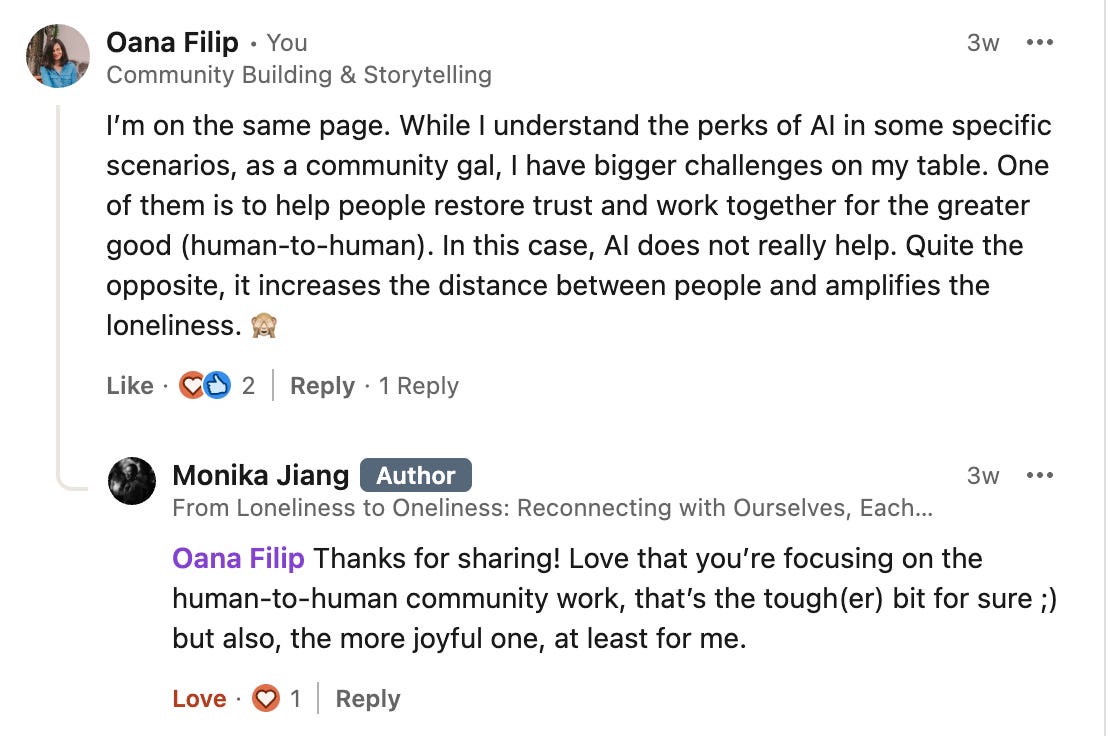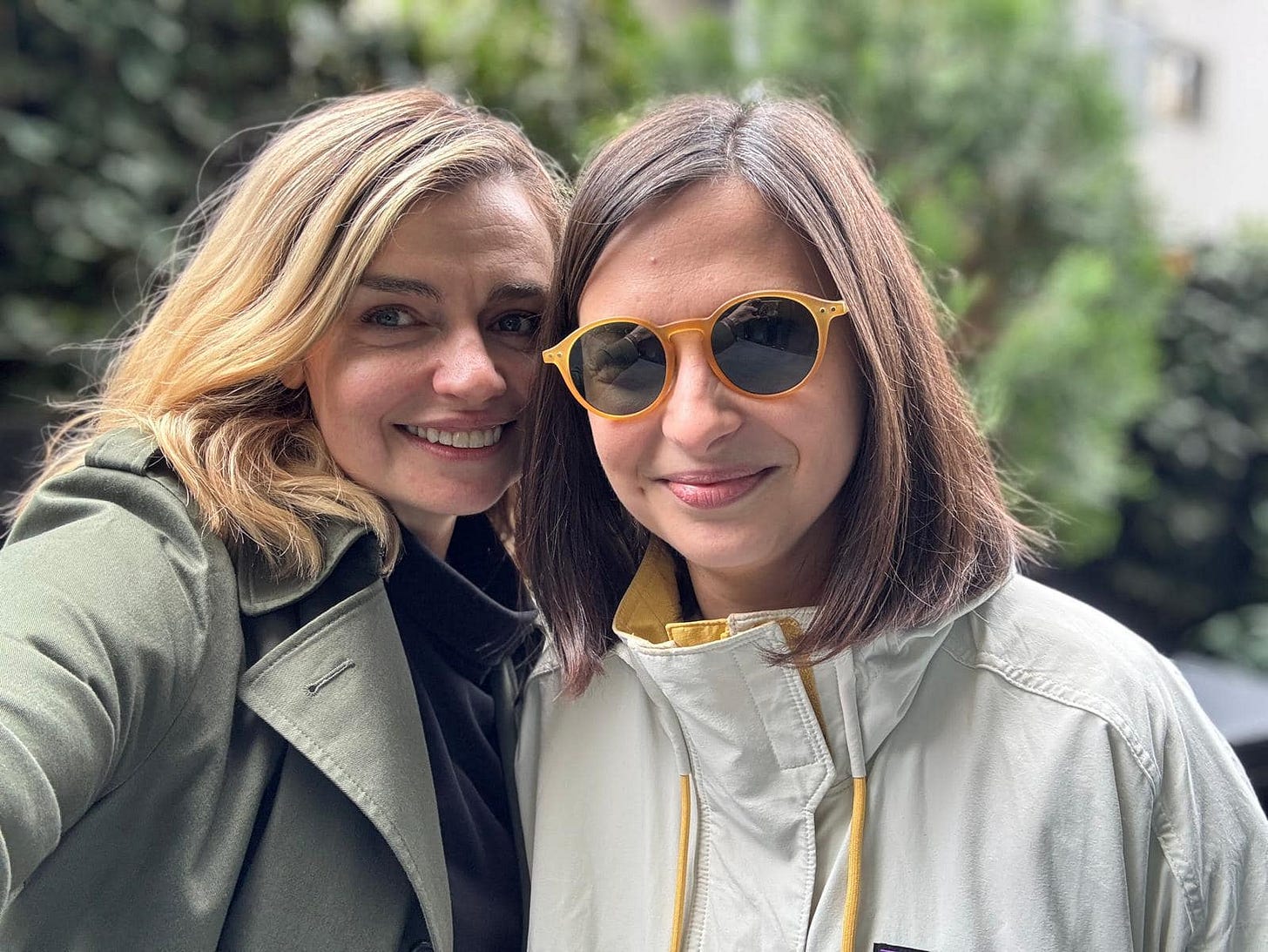Programul Community Building Takeoff este unul dintre containerele pe care le croșetez ca să îi ajut pe creatorii de comunități să facă mai bine în partea lor de lume, dar și să se bucure de călătorie. Când am scos în lume seria de ateliere digitale, nu mi-am imaginat cât de multe îmi va oferi la schimb.
Energia din fiecare întâlnire și felul în care am construit această experiență împreună cu participanții mi-au reamintit cât de bine se simte să stau printre oameni care au interese similare în zona de comunități. Nici nu contează câte știu sau cum fac.
Conversațiile care gravitează în jurul acestei preocupări sunt savuroase by default pentru că alimentează ceva ce eu voi continua să fac til the end, oricum ar arăta asta. Un club de pensionari care dansează pe Beyonce la 65+, o gașcă alături de care să mă asigur că fac 6000 de pași în fiecare zi, un grup de oameni care vrea să scrie poezie dintr-o zonă extrem de naivă și visătoare.
Datorită Ioanei, Anei, Mariei și Andrei, m-am simțit mai puțin singură în căutările mele în universul comunităților, iar asta e a big thing. Și îmi arată, încă o dată, că împreună e mai bine și mai distractiv.
“Loneliness in communities is often subtle.”
Acum câteva săptămâni scriam despre cum grija este un combustibil mai bun și mai necesar (astăzi) în construirea și consolidarea de comunități. Avem nevoie de candoare și blândețe mai mult decât de scalare și metrici. Nu zic că cele din urmă nu au rostul lor sau că reprezintă o alegere greșită, ci că singurătatea este atât de acută încât ne-ar prinde muuult mai bine să ne recăpătăm încrederea și dorința de a fi împreună.
Cu gândul acesta am contactat-o pe Monika Jiang, scriitor, facilitator și community builder preocupat de singurătate și felul în care relațiile construite cu sens ne pot ajuta să ne reapropiem într-o manieră sănătoasă și echilibrată. O urmăresc de anul acesta, iar de când am descoperit-o am avut un schimb valoros de idei. Poate unii dintre voi o știți de la Unfinished, festivalul din București, unde a avut un talk despre care am auzit că a fost pretty wow.
Las aici niște insights dintr-o conversație pe LinkedIn.
Pe lângă maniera profundă în care deconstruiește loneliness-ul și alternativa de narativ pe care o oferă, unul dintre punctele comune este modul în care social media ne modelează relațiile. E un subiect asupra căruia avem o optică similară, chiar complementară.
Așa că am întrebat-o cum putem să micșorăm distanțele dintre noi, să acceptăm imperfecțiunile și să tolerăm diferențele. Las răspunsurile în EN pentru că nu vreau să știrbesc din nuanțe.
What are the main reasons we struggle to create healthy relationships?
One challenge is that our understanding of healthy relationships is often unclear. While red flags, boundaries, and toxicity are common terms, they don't necessarily help us know what we truly want in relationships. Healthy relationships are deeply personal and nuanced; they require self-inquiry, understanding our own past, and how it shapes our behavior.
Trust is built on reciprocity; to receive it, we need to offer it. In communities, it’s essential to create safe spaces where people feel comfortable sharing without judgment.
We also live in a world where connection is often fleeting—relationships require cultivation, and in an age of liberated relationship forms, we’re challenged to define what fulfills us. It’s as much about our connection with ourselves as it is with others.
What’s the impact of social media on the quality of our bonds?
Social media and now increasingly AI have shifted relationships towards 'convenient' or ‘artificial’ intimacy, a term that MIT sociologist Sherry Turkle coined, flattening connections and replacing depth with speed. It’s become a world of artificial intimacy where relationships are curated rather than cultivated. This convenience approach to connection impacts our ability to truly engage, relate vulnerably, or sustain bonds. Relationships aren’t as immediate as social media would have us believe; they require time, care, and in-person presence that can’t be replicated digitally.
How would you describe loneliness within communities? How it’s felt, seen, experienced?
Loneliness in communities is often subtle—seen in reserved smiles or people keeping a safe emotional distance from one another. It can manifest as isolation even within crowded spaces, where individuals feel invisible or unseen despite being surrounded by others. This isolation often creates a quiet suffering, felt deeply but seldom shared. It’s a paradox, as community spaces should bring us closer, yet many people feel disconnected due to fear of vulnerability or rejection, sometimes retreating further rather than reaching out.
Rituals don’t have to be grand or spiritual to create connection. Sometimes, they’re just about building small, regular habits that help us feel a bit more anchored and seen.
Could you share a few tactics to convey trust and belongingness within a community?
Trust is built on reciprocity; to receive it, we need to offer it. In communities, it’s essential to create safe spaces where people feel comfortable sharing without judgment. This means showing up consistently, listening deeply, and engaging genuinely. Building trust also involves embracing our own vulnerabilities and encouraging others to do the same.
It's like Erikson’s stages of trust development—we need reliability, consistency, and care to build it over time. Encouraging shared experiences, whether through rituals or shared projects, fosters this sense of belonging by moving past individual fears and strengthening mutual support.
In which manner can rituals bridge the gap and bring us together?
Rituals don’t have to be grand or spiritual to create connection. Sometimes, they’re just about building small, regular habits that help us feel a bit more anchored and seen. They can manifest in less obvious ways, like organizing a neighborhood cleanup, a shared morning walk, or a coffee hour in the office where everyone takes a break together. In some regenerative communities, for example, groups take time each season to set collective intentions or simply reflect together on the highs and lows of the past months.
It’s less about formality and more about creating consistent, shared experiences. These simple rituals remind us that we’re not just going about things alone—they give us a chance to pause, show up, and connect in ways that feel natural and sustainable.
Răspunsurile Monikăi nu fac decât să adauge o tușă groasă peste o realitate pe care o observ și o resimt (într-o anumită măsură) pe pielea mea. Și pe care o aud în conversații de tot felul — oamenii se simt nevăzuți și neauziți. Doar că nimic nu se întâmplă izolat și fiecare contribuie la ce trăim colectiv.
Data viitoare când te întrebi de ce relațiile din viața ta arată cum arată, poate te vei uita la ce aduci în ele, ce alegi să alimentezi și care este narativul pe care îl pui pe masă. Pariul meu este că vei găsi răspunsuri care îți vor oferi indicii valoroase despre sine, dar și despre ce comunitate ai nevoie în perioada asta a vieții tale.
Poate te-ai săturat de conversații despre antreprenoriat, dezvoltare personală, civism sau feminitate. Poate vrei să aparții unui grup care explorează poveștile, scrisul, poezia, plimbările hai-hui, gătitul împreună, toate cu relaxare. Am povestit din plin despre nevoia de ludic, proiecte creative fără obiective by the book și nevoia de joacă cu Ana Sipciu de la Asteroid B612 (give it a go, îmi mulțumești mai târziu). 🤗
Orice ai alege, compasul intern ar trebui să indice o anumită apartenență și bucurie de a face parte din comunitatea cu pricina, nicidecum să întărească sentimentul de însingurare, izolare și judecată. Sau că ești pus la treabă. Un mod foarte simplu prin care poți să îți dai seama pe unde navighezi este să te întrebi cum te simți după anumite conversații sau întâlniri. Eu, de exemplu, am căpătat zvâc și curaj după întâlnirea cu Ana. Ceea ce vă doresc și dvs.
Cu lipici,
— Oana
P.S. Ilustrație de Ilinca Roman ✨
🍯 Resurse lipicioase
Apropo de singurătate, The Power of Storytelling revine după 5 ani și propune o temă de care avem mare nevoie: connection. Ia-ți bilet din timp și ne vedem în martie, la București.
“No one benefits from you scrolling on your phone and feeling sad and then going to Starbucks. The antidote is figuring out what you care about, what you're good at, and what you like doing that can make the world a little bit better. Then, really do that thing.” via Sublime
“Modern loneliness masks itself as hyper connectivity. And so people have easily 1000 virtual friends, but no one they can ask to feed their cat. That loneliness, which is really a depletion of the social capital, is extremely powerful. […] For us as adults, that means talking to people in the queue with you, talking to people on the subway, talking to people when you create any kind of group. Book club, movie club, sports club. You stay in the practice of experimentation, doubt, of the paradox of people: You need people very much but the very people that you need are the ones that can reject you. Relationships, friendships are complex systems. They often demand that they hold two sides of an equation. And not that you solve little problems with technical solutions. And that is intrinsic to modern loneliness.” via Esther Perell







Să știi că zvâc și curaj ai adus tu la întâlnire, omleta cred că doar le-a adus la suprafață 🥰 Always a joy! 🤗
Îți las și un articol tangent cu tema de azi. Loneliness is a disease, probabil că ar trebui să existe ceva public service announcements pe tema asta, precum cele din băile publice despre spălat pe mâini.
[Turns out the zombie apocalypse isn’t as fun as they said it would be – Rebecca Solnit on our dangerously disconnected world | Society | The Guardian](https://www.theguardian.com/society/2024/nov/16/zombie-apocalypse-dangerously-disconnected-world-rebecca-solnit)